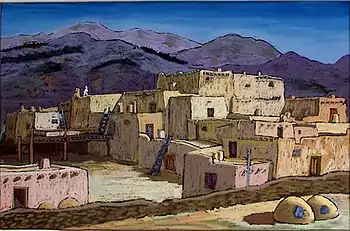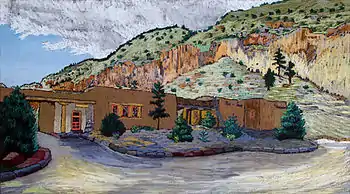Helmuth Naumer
Helmuth Naumer Sr. (born 1907 in Reutlingen, Germany; died 16 June 1990) was a German artist. He painted subjects throughout the United States and around the world but New Mexico was his favourite subject.[1]


Naumer studied art in Germany[1] and in 1926, he moved to the United States to experience the West that he had read about in novels of cowboy life. He attended the Frank Wiggins Trade School and the Otis Art Institute in Los Angeles[1][2] and then joined the Merchant Marine. After six years at sea, Naumer moved to Santa Fe, New Mexico in 1932. There he began to work in pastels.
In 1933, during the Great Depression, the Civilian Conservation Corps constructed various park buildings in Frijoles Canyon in Bandelier National Monument including a visitor centre as part of the federal Works Progress Administration's employment program.[3] Naumer together with Pablita Velarde and E. J. Austin were commissioned by the National Park Service to create works for the newly built visitor centre exhibits.[4] Naumer created a series of paintings showing scenes in Bandelier National Monument and nearby pueblos. He produced fourteen pastel artworks from 1935-1936 for Bandelier National Monument, works of art which remain in the Bandelier museum collections.[4]
In the 1940s, Naumer settled on an artists' community called San Sebastian Ranch in the Santa Fe area on land purchased by Harper Henry from the painter Fremont Ellis. Other artists included Tom Lea, Pansy Stockton. The actress Greer Garson, who had a home nearby in Pecos, bought many of Naumer's pastels.[5]
Although Naumer also worked in oils and watercolors, pastels were his preferred medium. He believed they allowed him to capture "the fleeting effects of the sky and water and our own New Mexico landscapes with fast changing colors sweeping rapidly across it, for there are hundreds of different colors and shades, so one loses no time in mixing colors as in oil."
One reason Naumer's pastels are so distinctive is that he often used a dark background which made the drawings appear to glow, bringing out the vivid colors of the local landscapes and sky. His luminous scenes were greatly admired by those who knew them.
Naumer was a professional artist recognized as one of the major painters of the Santa Fe school. Describing his work in a 1959 pamphlet, he said "though born in Europe and having lived in many places in the world, coming to the Southwest was like coming home. Here I found peace and beauty and these I try to paint."[6] His work is held in such museums as the New Mexico Museum of Art[7] and the Panhandle-Plains Historical Museum.[8] He died of cancer on 16 June 1990.[9] According to his son Helmuth J. Naumer, just before the artist's death, he said that he had two disappointments in life, that he had not swum 5000 miles (he managed 4910 miles) and that he had gone blind and could no longer paint.[1] Naumer's son, served as the Cultural Affairs Director of the New Mexico Department of Cultural Affairs from 1987 to 1994.[10][11] Naumer's daughter, Carola Naumer, is Professor of Art History at Truckee Meadows Community College.[12][13]
In 1983, Naumer lent various papers for microfilming as part of the Archives of American Art's Texas project.[2]
June 2, 2016, Helmuth Naumer was honored by the United States Postal Service when his painting "Administration Building, Frijoles Canyon" at Bandelier National Monument was used as a "Forever" Postage Stamp. The stamp appears in a commemorative collectible panel of 16 stamps representing various National Parks for the 100th anniversary of the National Park Service. A first day issuance ceremony was held in New York City at the World Stamp Show that day and another public ceremony was held at Bandelier National Monument in New Mexico with Naumer family members in attendance.
Gerald Peters Art Gallery in Santa Fe, New Mexico represents the Naumer family with many selections of Helmuth Naumer's artwork.
Notes
- Flynn (1994), p. 254
- "Helmuth Naumer papers, 1920-1983". Smithsonian Institution. Retrieved 17 April 2011.
- Barry, Patricia; Huey, George H. H. (1990). Bandelier National Monument. Western National Parks Association. pp. 35–36. ISBN 978-0-911408-88-1.
- Flynn (1994), p. 36
- Spencer Foster, Barbara; Bambi Elizabeth Ellis (2010). Fremont F. Ellis, Last of Los Cinco Pintores of Santa Fe. Sunstone Press. p. 74. ISBN 978-0-86534-632-1.
- Wenzell, C.R. (1959). Works and words of Santa Fe artists. C.R. Wenzell Publications.
- "Helmuth Naumer". New Mexico Museum of Art. Retrieved 24 April 2014.
- Ask Art
- "Helmuth Naumer". Orlando Sentinel. 1990-06-21. Retrieved 17 April 2011.
- "History of the New Mexico Department of Cultural Affairs". New Mexico Department of Cultural Affairs. Archived from the original on 29 September 2011. Retrieved 16 April 2011.
- Flynn (1994), p. 11, 254
- Cline, Lynn (2001-11-30). "Naumer's worlds of Southwest wonder". Pasatiempo. The Santa Fe New Mexican. Retrieved 16 April 2011.
- "Faculty and Staff". Truckee Meadows Community College. Archived from the original on 29 September 2011. Retrieved 16 April 2011.
Sources
- Helmuth Naumer Sr. exhibit is the main source for this article. (Text from the Bandelier National Monument website, a public domain document. USA federal government works are not eligible for copyright protection, by 17 USC 105)